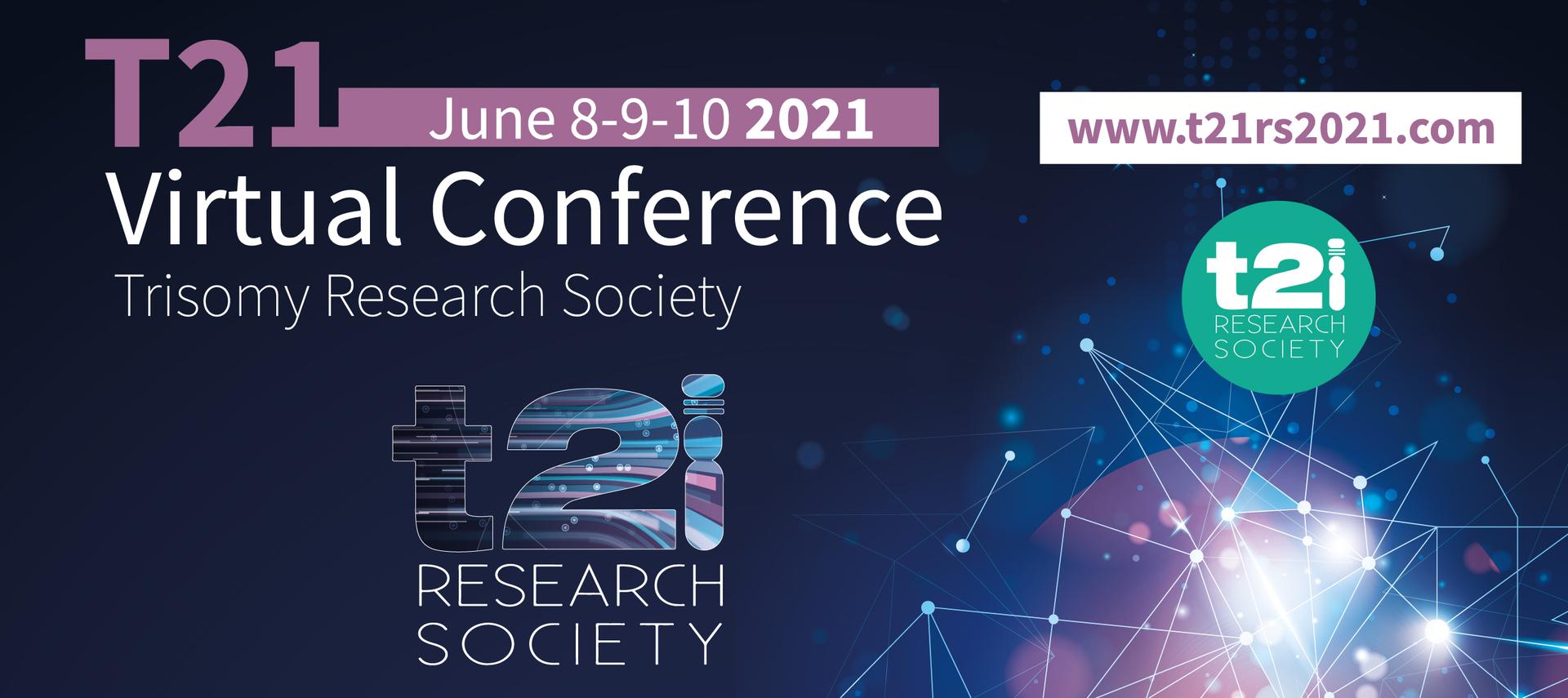

|
|
Message from the President of T21RS
This has been a year like no other for people with Down syndrome, their families and the T21RS research community. Many people in our communities have been profoundly affected by the COVID-19 pandemic. But through everything, the ability and willingness of people to pull together and address the challenge we are facing has been inspirational. I am particularly grateful for the commitment and support we have received from representatives of the many Down syndrome organisations during our regular stakeholder meetings as part of the T21RS COVID-19 initiative.
Equally impressive has been the hard work of the T21RS research community to understand the risk associated with infection with SARS-Cov-2. Early during the pandemic, several of our colleagues highlighted the theoretical risks, including Mara Dierssen and colleagues ( Read Paper here) and Joaquin Espinosa(Read Paper here) . Eitan Okun led an effort by the preclinical committee of the T21RS to conduct a comprehensive literature review for an in-depth understanding of the immune factors that may put people with Down syndrome at increased risk, and the implications for emerging infectious diseases such as COVID-19. This have been summarised in two papers, submitted to the journals Alzheimer’s & Dementia, and Frontiers in Immunology. A complementary review of respiratory illness was published by Stephanie Santoro and colleagues
Meanwhile, the T21RS clinical committees organised an international survey to understand the presentation, complications and outcomes when people with Down syndrome are infected with SARS-Cov-2. Stephanie Sherman, Anke Huels, Alberto Costa and many other colleagues worked tirelessly to collate data from clinicians and families of affected individuals, and we are grateful for the support from all the organisations that agreed to fund this effort; in particular to Hampus Hillerstrom and Jim Hendriks of the Lumind RDS Foundation who coordinated the funding effort.
We have so far gathered data on more than 1,000 individuals with Down syndrome who have been diagnosed with COVID-19, and the analyses have been published recently in a pre-print report . We showed that although individuals with Down syndrome may have a mortality risk associated with COVID-19 that is approximately 3 times higher than in the general population, children and young people with Down syndrome may not have the same elevated mortality risk as older adults. The survey has informed our campaign to prioritise immunisation for people with Down syndrome which was featured in a Science news report this week – click here to view article
Unfortunately, the pandemic has impacted on our plans for an international meeting next year. Instead, Liz Head and Jorge Busciglio and their colleagues will deliver an exciting virtual meeting during June 8-10, 2021. Please diarise the dates. In the meantime, the organising and planning committees are continuing to plan an in-person meeting in California during 2022.
Our research community and stakeholder partners have played a vital role in the fight against COVID-19. I am convinced that a lot of good will come from our communal efforts to overcome adversity during this year. But much remains to be done - in the words of Anne-Sophie Rebillat of the Science and Society committee in our previous newsletter: “Let us not hide behind the perceived frailty of people with Down syndrome when it is the fragility of our health care systems and of our societies that has to be addressed.”
Let us hope that 2021 will turn out to be a year for positive change. Wishing you a happy festive period, with best wishes from the T21RS executive.
Andre Strydom
T21RS President
|
|
T21RS News
T21RS Virtual Conference
We are pleased to announce our first virtual T21RS conference that will be held on June 8, 9 and 10th in 2021.
This virtual program will provide us with an opportunity to stay engaged and informed on exciting new developments in research to advance our understanding of conditions associated with Trisomy 21 to improve the quality of life for people with Down syndrome.
A virtual format for 2021 will ensure the safety of our T21RS members, sponsors, families and self-advocates in the time of COVID.

|
|
Winners of the Annette Karmiloff-Smith and Michael Harpold Dissertation Award 2019 competition for outstanding PhD thesis
The Education and Training Committee received applications of high quality. The theses submitted by Andrea Giacomini and Rosalyn Hithersay were considered by the Evaluation Committee as the top two.
The thesis by Dr. Andrea Giacomini is titled “Pharmacotherapies targeted to neurogenesis in order to rescue cognitive performance in Down syndrome”. The research conducted by Dr. Giacomini involved analysing the effects of neonatal treatment with several pharmacotherapies (ELND006, EGCG, 7,8-DHF) to improve cognition in the Ts65Dn mouse model of Down syndrome.
The thesis by Dr. Rosalyn Hithersay is titled “Exploring executive functioning and frontal cortical activity using functional near infrared spectroscopy”. The study investigates the feasibility of using functional near infrared spectroscopy (fNIRS) to measure frontal cortical activity in adults with Down syndrome during tasks of executive functioning and shows the differences in task performance based on age and cognitive decline status.
The Education and Training Committee would like to thank all the young researchers who participated in the competition by applying with publications that all show high quality and great impact.
|
|
T21RS Indian Chapter Activities
The Indian Chapter of T21RS is planning to organize on March 2021 in Kolkata (India), an advocacy program followed by free health check-up camp for Down syndrome children from marginalized poor families. The pandemic of COVID 19 has made the living of these groups more difficult and affects adversely the living of their Down syndrome children too. The program includes advocacy lectures and scientific talks to provide awareness and updates regarding the heath issues (cognitive impairment, congenital heart defects, respiratory problems, immunosuppression etc.) of Down syndrome children among the parents from the backward classes. The program will focus on the importance of their engagement in the research activities for greater benefit for their children and society. In the second phase of this program, free health check-up service for their children will be offered to the families. T21RS will support this event.
|
|
Update you Information on the Membership Area
Dear members this is an invitation to update your information on the membership area.
A new field of Research Area has been added in order to meet fellow colleagues and improve Down syndrome research.
Highlighted Articles
Gestational age is related to symptoms of Attention-Deficit/Hyperactivity Disorder in late- preterm to full-term children and adolescents with Down syndrome
Laura Del Hoyo Soriano, Tracie Rosser, Debra Hamilton, Taylor Wood, Leonard Abbeduto, Stephanie Sherman
Sci Rep. 2020 Nov 23;10(1):20345
The study investigated the influence of gestational age in later symptoms of attention-deficit/hyperactivity disorder in 105 individuals (49 males and 56 females; aged 6–18 years) with Down syndrome who were born at or after 35 weeks gestation. Maternal age at birth, maternal level of education, household income, as well as sex, chronological age, and cognitive level of the participant with Down syndrome were considered in the analysis. Results from this study show that gestational age is related to inattentive and hyperactive/impulsive symptoms in children and adolescents with Down syndrome. Therefore, gestational age should be addressed when considering symptoms of attention-deficit/hyperactivity disorder, as it may have implications for early interventions. More attention is needed toward the advancement of care and follow-up for infants with down syndrome who are born even late preterm or early term.
Read the article following this link
|
|
Pneumonia and respiratory infections in Down syndrome:
A scoping review of the literature
Stephanie L Santoro, Brian Chicoine, Joan M Jasien, Judy Lu Kim, Mary Stephens, Peter Bulova, George Capone
Recently, it has been published an interesting literature review of pneumonia and respiratory infections in Down syndrome. The idea for this review came directly from discussion at the Down syndrome Medical Interest Group (DSMIG-USA) Adult Workgroup in 2019.
The take messages from the article are:
Pneumonia and respiratory infections are more prevalent and more severe in individuals with Down syndrome compared to healthy controls
There are gaps in the literature regarding the etiology of pneumonia, the infectious organism, risk factors for infection, and to guide options for prevention and screening.
There is urgent need for additional research studies in Down syndrome to address these gaps
Read the review following this link
|
|
Down syndrome biomedical updated list of References and Abstracts from the Fundación Iberoamericana Down 21
The Fundación Iberoamericana Down 21 shares an updated list of References and Abstracts on Down syndrome. You can find the references for the period November 2020 - December 2020 at:
https://www.down21.org/citas-bibliograficas.html
(Link provided by Jesús Flórez, M.D., PhD., President of the Fundación Iberoamericana Down21)
|
|

|
|
